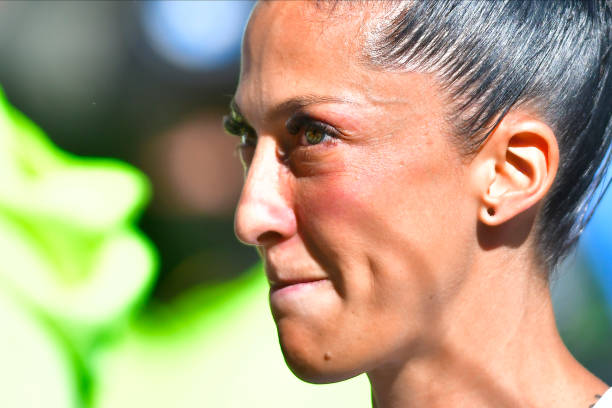Jenni Hermoso questions RFEF’s safety claims: asks, ‘Protect me from what and whom?’

In a recent social media post, Jenni Hermoso challenged the RFEF’s decision to exclude her from the current women’s team, asking why they claim it’s for her ‘protection.’ This controversy has ignited a debate about player safety and inclusion in women’s football.
While writing in this post that sent shockwaves through the world of women’s football, Spanish international player Jenni Hermoso raised thought-provoking questions about the Royal Spanish Football Federation’s (RFEF) claims regarding player safety.
With a mix of curiosity and concern, she asked a simple yet profound question: “Protect me from what and whom?” These words echoed not only her own uncertainty but also ignited a debate on player inclusion, transparency, and the evolving landscape of women’s sports.
Val9ja will delve into this controversy, exploring the context, Hermoso’s perspective, and the broader implications for the sport.
Spain’s women’s senior team was on the verge of a breakup before the FIFA Women’s World Cup, but was held together by the presently-disgraced RFEF president, Luis Rubiales. Many female players had submitted they would not play for their country anymore till the RFEF removed Jorge Vilda as their coach. Luis Rubiales would retain the coach – and this would help Spain lift their first FIFA Women World Cup in history.
Following this victory at Australia, however, Luis Rubiales would blunder at the prize-giving ceremony by kissing Jenni Hermoso on the lips. A kiss the player later started claiming was against her will. This was the last straw that broke the camel’s back at RFEF, because the controversy it kindled caused the sack of the coach and the president’s resignation.
Women’s football is recently gaining fame due to the action the women put up throughout the competition, but the controversy that came in the end got many wishing the contest never held.
One of the things clearly still lacking in the RFEF concerning women’s football is player inclusion in safety measures. According to the recent judgment passed by Spain’s sports court (TAD), where Luis Rubiales’ misbehaviour was called ‘serious, but not too serious’, an old law that needs to be updated was being used by the federation (RFEF). This statement of theirs raised several questions on player safety concerns in women football.
According to the official statement of the court, the kiss which was considered absurd by many (because of Luis Rubiales’ role in the federation) was no enough to bring about his sack. Even future serious accusations by Luis Rubiales’ uncle, who affirmed the former president slept with girls young enough to be his [Rubiales’] daughters did not affect the case in any way.

Hermoso’s protect me from what and whom staement went as follows:
‘A claim was made today stating that the environment within the federation would be safe for my colleagues to rejoin, yet at the press conference it was announced that they were not calling me as a means to protect me.
‘Protect me from what? And from whom?’
This was after the new women’s coach, Montse Tome excluded Jenni Hermoso from the list of players to play in her new team, after reportedly-all the female players boycotted the federation over the kiss. Tome alleged the decision was meant for Hermoso’s protection, following the highly-publicised scandal at the World Cup.
She wanted to know the meaning of RFEF’s seemingly-ambiguous stance on player safety and protection, which saw them dull in bringing the appropriate ‘structural changes’ the boycotting women were demanding.
Now the women players yet refuse to play for their country, and dropped a statement to show they would prepare for the legal consequences. The repercussions of such a refusal include a 30,000 Euros fine, and a ban of up to 15 years from playing for the country.
On that topic, Hermoso also dropped a statement.
‘The players are certain that this is yet another strategy of division and manipulation to intimidate and threaten us with legal repercussion and economic sanctions,’ she stated.
‘It is yet more irrefutable proof that shows that even today, nothing has changed.’









